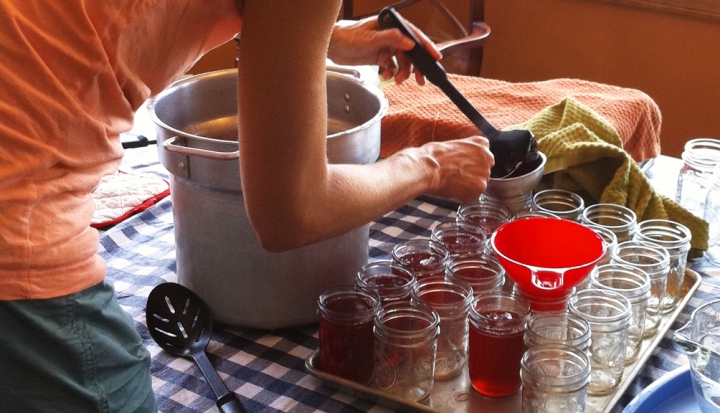When I was in graduate school studying theology, I started a blog. Frustrated with the monotony of studying all day, I needed something to break up the hours I’d spend with my nose in a book. I was also recently married, and my husband and I were learning how to live together, cook together, and clean together. I intended to log the trials and triumphs of navigating this new domestic situation and titled my blog with my tongue firmly in my cheek: House Spouse.
Over time, my blog’s focus shifted to just food. Baking bread proved far more enjoyable than pouring over Karl Rahner’s theology of the economic and immanent trinity. Some nights after a particularly elaborate dinner, while my husband did the dishes, I’d think about whether my newly acquired culinary skills weren’t some manifestation of traditional gender roles in our family of two.
In her book Homeward Bound: Why Women Are Embracing the New Domesticity (Simon & Schuster), journalist Emily Matchar ponders something similar. In the past several years, she’d observed the proliferation of lifestyle blogs across the Internet in which young women mostly born in the 1980s and ’90s were “reclaiming” the skills more likely to be honed by women born in the 1880s and ’90s—skills like sewing, knitting, canning, and even churning their own butter. Matchar, herself admittedly becoming obsessed with the digital images of domestic perfection on every blog worth its weight in pickling salt, began asking herself what was behind this trend and, more importantly, what did it all mean?
“I began to see that the phenomenon was deeply rooted in the sweeping social, environmental, and economic factors that have transformed America from the ego-drunk boomtown of the 1990s to the rather humbled, nervous nation of today,” she writes. Distrust toward the government and large corporations, mounting concerns for the environment, frustration with the demands of corporate culture in which people and their time are undervalued, and a slow economy are just some of the reasons the people Matchar interviewed said they are finding more meaning, satisfaction, and a sense of control by shopping at local farmer’s markets and preserving their own food, among many other lifestyle choices oft preceded with the term “artisanal.”
While men sporting handlebar mustaches and bushy beards have taken to learning to butcher their own meat and brew their own beer, the “new domesticity” is mostly being embraced by women. Not unsurprisingly, there has been pushback, largely from feminists of the previous generation who see red when they read another article about women “opting out” of a career track and tying on the very aprons their foremothers worked so hard to loose.
Matchar even writes, “If women cut back on their ambitions en masse, institutional change will never happen and the glass ceiling will lower. We need to be there to demand equal pay, mandatory maternity leave, more humane hours. Leaving the ‘dirty work’ of working to the men is a way of muffling our own voices.”
Matchar’s concern is in the right place, but the criticisms of the new domesticity are almost as unproductive as the pressure long suffered by women to be perfect wives and mothers, or to even be them at all. It essentially blames women for the injustices we continue to endure and places the brunt of the responsibility to change the world on us. We’re damned if we do and damned if we don’t.
Case in point: A friend of mine was regularly overwhelmed with housework. Her two part-time jobs—which really amounted to more than full-time work—and her energetic son made her feel as if she couldn’t keep up with her family’s laundry, dusting, and vacuuming. Her husband also worked full-time, and the two of them didn’t want their limited family time to be taken up by household chores.
I suggested outsourcing some of the cleaning. “I’d feel so guilty about that,” she confided. “It would be admitting that I’m not a good wife and mother.” This from my liberated, cool mom friend. I couldn’t believe it. But then I remembered my own guilt at my failure to bake a loaf of bread every week, a challenge my husband would never take quite so seriously.
Likewise another friend, a mother of two, reduced her work hours after her first child was born, only to find that she was working just as many hours as before for her employer, only on her “own time.” Yet, she was being paid only for her “part-time” work. She’s an excellent mother and artist who obviously wants to spend more time crafting with her daughters than staring at a computer screen all day. But I think even if money weren’t an issue, her background in women’s studies would keep her from ever leaving her job, even if only for a short while. We women are at once haunted by images of Betty Friedan and Betty Crocker, tsk-tsking at us for our failures at work and at home.
One of Matchar’s “lessons for the future” is that we should “enfranchise” men, and I agree. “Young men don’t want to be like their dads any more than young women want to be like their moms,” she writes. One of clearest indications of this is in the American prime-time sitcom, where the stern father, approached by his children with a healthy dose of fear (“Just wait until your father gets home,” TV moms would say), has been replaced by the goofy, fun-loving father who acts more like a kid than a parent.
So perhaps we’re on our way. But we’re never going to get there if we keep playing the blame game where women always lose.
This article appeared in the January 2014 issue of U.S. Catholic (Vol. 79, No. 1, pages 40-41).
Image: Flickr photo cc by AverageJane















Add comment